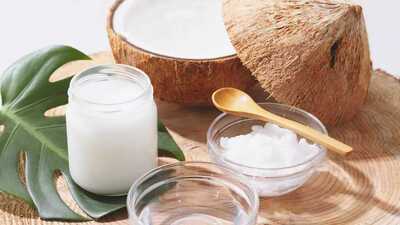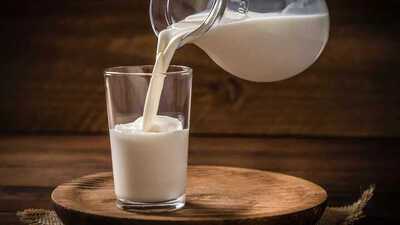Is Soy milk better than Cow milk: Which is better
There’s no denying that Indians and their love for cow’s milk is beyond words! But with growing inclination towards health and fitness, people are gradually moving away from traditional animal based milk and opting for plant based alternatives that are deemed believed to be healthy and have minimal side effects. Here’s an insight on two of the most popular types of milk and which one is better. Let’s find out…
 Is soy milk actually healthy?
Is soy milk actually healthy?
Soy milk is made by soaking and grinding soybeans, then boiling the mixture and filtering it to create a creamy plant-based milk. It contains about 6 to 7 grams of protein per cup, making it comparable to cow milk’s protein content. Unlike cow milk, soy milk contains no cholesterol and is naturally lactose-free, which benefits people with lactose intolerance or dairy allergies.
Video
Soy milk is a good source of unsaturated fats, particularly omega-3 and omega-6 fatty acids, which are beneficial for heart health. Soy milk is often fortified with essential nutrients like calcium, vitamin D, and B vitamins to match or exceed the nutrient content of cow milk. Additionally, it contains isoflavones, plant compounds with antioxidant properties, which may have heart-protective and anti-inflammatory effects.

Why is cow milk?
Cow milk is rich in high-quality complete proteins, with about 8 grams per cup, and naturally provides calcium, phosphorus, vitamin B12, and vitamin A. It has a higher saturated fat and cholesterol content compared to soy milk and contains lactose, a sugar some individuals cannot digest well. Cow milk offers natural nutrients important for bone health and muscle function but may not be suitable for those with dairy allergies or lactose intolerance.

Which is better?
Soy milk’s health benefits include its plant-based protein source, absence of cholesterol and lactose, heart-healthy fats, and presence of bioactive compounds like isoflavones. These factors contribute to lowering LDL cholesterol and reducing cardiovascular risk. For individuals avoiding animal products or managing lactose intolerance, soy milk provides a nutritious alternative. However, cow milk’s nutrient density, especially in calcium and vitamin B12, remains advantageous for those who tolerate it well.
To conclude
In a nutshell it can be concluded that soy milk is better for those seeking a plant-based, cholesterol-free, lactose-free alternative with a strong protein content and heart health benefits. Cow milk is better for individuals who prioritize naturally occurring calcium, vitamin B12, and high-quality complete protein if they have no issues with lactose or dairy allergies.
There’s no denying that Indians and their love for cow’s milk is beyond words! But with growing inclination towards health and fitness, people are gradually moving away from traditional animal based milk and opting for plant based alternatives that are deemed believed to be healthy and have minimal side effects. Here’s an insight on two of the most popular types of milk and which one is better. Let’s find out…
 Is soy milk actually healthy?
Is soy milk actually healthy? Soy milk is made by soaking and grinding soybeans, then boiling the mixture and filtering it to create a creamy plant-based milk. It contains about 6 to 7 grams of protein per cup, making it comparable to cow milk’s protein content. Unlike cow milk, soy milk contains no cholesterol and is naturally lactose-free, which benefits people with lactose intolerance or dairy allergies.
Video
Soy milk is a good source of unsaturated fats, particularly omega-3 and omega-6 fatty acids, which are beneficial for heart health. Soy milk is often fortified with essential nutrients like calcium, vitamin D, and B vitamins to match or exceed the nutrient content of cow milk. Additionally, it contains isoflavones, plant compounds with antioxidant properties, which may have heart-protective and anti-inflammatory effects.
Why is cow milk?
Cow milk is rich in high-quality complete proteins, with about 8 grams per cup, and naturally provides calcium, phosphorus, vitamin B12, and vitamin A. It has a higher saturated fat and cholesterol content compared to soy milk and contains lactose, a sugar some individuals cannot digest well. Cow milk offers natural nutrients important for bone health and muscle function but may not be suitable for those with dairy allergies or lactose intolerance.
Which is better?
Soy milk’s health benefits include its plant-based protein source, absence of cholesterol and lactose, heart-healthy fats, and presence of bioactive compounds like isoflavones. These factors contribute to lowering LDL cholesterol and reducing cardiovascular risk. For individuals avoiding animal products or managing lactose intolerance, soy milk provides a nutritious alternative. However, cow milk’s nutrient density, especially in calcium and vitamin B12, remains advantageous for those who tolerate it well.
To conclude
In a nutshell it can be concluded that soy milk is better for those seeking a plant-based, cholesterol-free, lactose-free alternative with a strong protein content and heart health benefits. Cow milk is better for individuals who prioritize naturally occurring calcium, vitamin B12, and high-quality complete protein if they have no issues with lactose or dairy allergies.
You may also like

Cameron Norrie reveals secret weapon used to upset Carlos Alcaraz for sweet revenge

'Burnt-on' hob stains vanish in seconds thanks to 1 unexpected item

Elon Musk's Starlink to run technical, security demos in Mumbai from Oct 30

Thinking about farm loan waiver, never said won't do it: CM Fadnavis

Palaniswami directs booth-level AIADMK leaders to ensure diligent electoral roll verification






